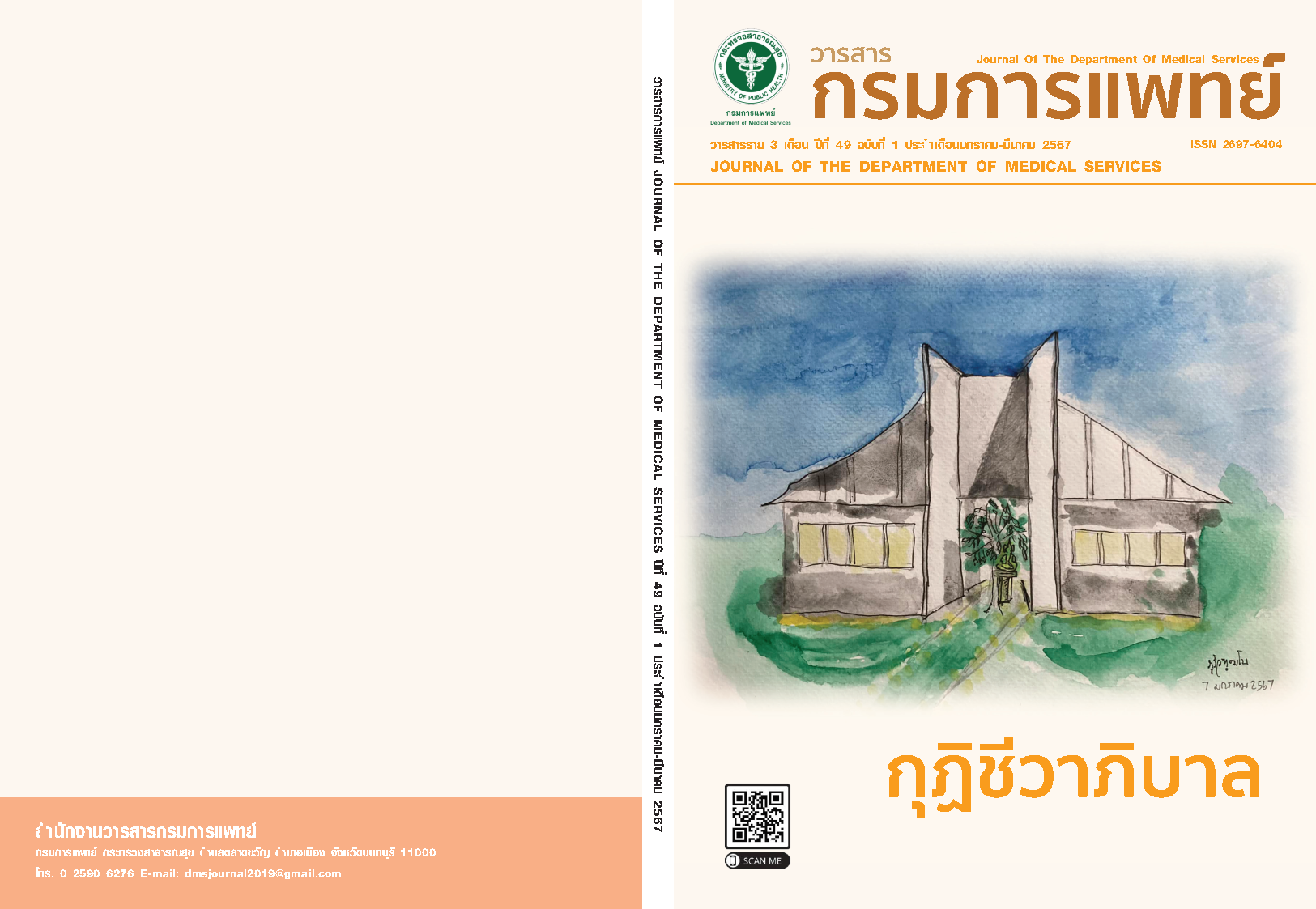The Health Impact Associated with Stress of Nurse Practitioners Working during COVID-19 Pandemic
Keywords:
Health, Stress, Effect, Nurse practitioner, COVID-19Abstract
Background: Since 2019, nurse practitioners had been enduring and persevering during the COVID-19 pandemic. While the number of patients had been increasing, healthcare staff numbers remained the same. This brought stress to the staff and later caused health problems. Objective: To study the health impact associated with stress of nurse practitioners working during COVID-19 pandemic. Method: This was a survey study comprising of personal information and Stress Scale (PSS-10) evaluation. Result: The sample population was a total of 119 nurse practitioners responsible for COVID-19 screening for patients in Ubon Ratchathani Province. The samples had a mean age of 37.9±8.6 years and a mean year of working experience 15.6±8.7 years. Evaluation among 119 samples, the PSS-10 demonstrated 73 (61.3%) having a moderate level of stress and 46 (38.7%) with a mild level of stress. The health impact survey showed that 71 people (59.7%) having regular physical activity, 29 people (21.8%) having no regular physical activity, 109 people (91.6%) not drinking alcohol, all people not smoking, 90 people (59.7%) having no trouble in sleeping, 20 people (16.8%) waking up in the middle of the night. The relationship between the mentioned survey and level of stress was at 0.05 of the statistical significance only for the health perception, 97 people (81.5%) have the same health perception while 18 people (15.1%) feeling weaker. (R2 = .36, = -3.40 , p < .05). Conclusion: The research showed that nurse practitioners’ health perception during COVID-19 pandemic related to stress. Therefore, a policy to promote physical and mental health wellness would help reduce healthcare staff’s level of stress.
References
World Health Organization (WHO). WHO characterizes COVID-19 as a pandemic. [internet]. 2020 [cited 2021 Jan 21]. Available from: https://www.who.int/emer gencies/diseases/novel-coronavirus-2019/eventsas-they-happen.
Ives J, Greenfeld S, Parry JM, Draper H, Gratus C, Petts JI, et al. Healthcare workers’ attitudes to working during pandemic influenza: a qualitative study. BMC Public Health 2009;9:56.
Seale H, Leask J, Po K, MacIntyre CR. “Will they just pack up and leave?” - attitudes and intended behaviour of hospital health care workers during an influenza pandemic. BMC Health Serv Res 2009;9:30.
Koh Y, Hegney D, Drury V. Nurses’ perceptions of risk from emerging respiratory infectious diseases: a Singapore study. Int J Nurs Pract 2012;18(2):195-204.
World Health Organization (WHO). State of the World’s Nursing 2020: Investing in education, jobs, and leadership. [internet]. 2020 [cited 2021 Jan 21]. Available from: https://www.who.int/publications/i/ item/9789240003279.
Fernandez R, Lord H, Halcomb E, Moxham L, Middleton R, Alananzeh I, et al. Implications for COVID-19: A systematic review of nurses’ experiences of working in acute care hospital settings during a respiratory pandemic. Int J Nurs Stud 2020;111:103637.
Hope K, Massey PD, Osbourn M, Durrheim DN, Kewley CD, Turner C. Senior clinical nurses effectively contribute to the pandemic influenza public health response. Australian Journal of Advanced Nursing 2011; 28(3): 47-53.
Seale H, Leask J, Po K, MacIntyre CR. “Will they just pack up and leave?” - attitudes and intended behaviour of hospital health care workers during an influenza pandemic. BMC Health Serv Res 2009;9:30.
Huang L, Lei W, Xu F, Liu H, Yu L. Emotional responses and coping strategies in nurses and nursing students during covid-19 outbreak: A comparative study. PLoS One 2020;15(8):e0237303.
Chiang HH, Chen MB, Sue IL. Self-state of nurses in caring for SARS survivors. Nurs Ethics 2007;14(1):18-26.
Hope K, Massey PD, Osbourn M, Durrheim DN, Kewley CD, Turner C. Senior clinical nurses effectively contribute to the pandemic influenza public health response. Australian Journal of Advanced Nursing 2011;28(3):47-53.
Batra K, Singh TP, Sharma M, Batra R, Schvaneveldt N. Investigating the Psychological impact of covid-19 among healthcare workers: A meta-analysis. Int J Environ Res Public Health 2020;17(23):9096.
Department of Mental Health. Mental Health Recovery Plan in the Situation of the COVID-19 Pandemic. [Internet]. 2020 [cited 2021 Jan 21]. Available from: https://www.dmh.go.th/intranet/p2554/Mental_ Health_Recovery_Plan_Revised.pdf.
Martin SD, Brown LM, Reid WM. Predictors of nurses’ intentions to work during the 2009 influenza A (H1N1) pandemic. Am J Nurs 2013;113(12):24-31; quiz 32.
Shiao JS, Koh D, Lo LH, Lim MK, Guo YL. Factors predicting nurses’ consideration of leaving their job during the SARS outbreak. Nurs Ethics 2007;14 (1):5-17.
Kroenke K, Spitzer RL, Williams JB. The PHQ-9: validity of a brief depression severity measure. J Gen Intern Med 2001;16(9):606-13.
Spitzer RL, Kroenke K, Williams JB, Löwe B. A brief measure for assessing generalized anxiety disorder: the GAD-7. Arch Intern Med 2006;166(10):1092-7.
Wongpakaran N, Wongpakaran T. The Thai version of the PSS-10: An Investigation of its psychometric properties. Biopsychosoc Med 2010;4:6.
Department of Mental Health. National Mental Health Assessment of Thai People. [Internet] [cited 2021 Jan 31] Available from: https://datastudio.google.com /u/0/reporting/97482bef-acb2-4cdb-a3c6-184a 830161d1/page/yvkpB.
Rossi R, Socci V, Pacitti F, Di Lorenzo G, Di Marco A, Siracusano A, et al. Mental health outcomes among frontline and second-line health care workers during the Coronavirus Disease 2019 (COVID-19) pandemic in taly. JAMA Netw Open 2020;3(5):e2010185.
Zhang WR, Wang K, Yin L, Zhao WF, Xue Q, Peng M, et al. Mental health and psychosocial problems of medical health workers during the COVID-19 epidemic in China. Psychother Psychosom 2020;89(4): 242-50.
Saqlain M, Munir MM, Rehman SU, Gulzar A, Naz S, Ahmed Z, et al. Knowledge, attitude, practice and perceived barriers among healthcare workers regarding COVID-19: a cross-sectional survey from Pakistan. J Hosp Infect 2020;105(3):419-23.
Huang Y, Zhao N. Generalized anxiety disorder, depressive symptoms and sleep quality during COVID-19 outbreak in China: a web-based cross-sectional survey. Psychiatry Res 2020;288:112954.
Mulyadi M, Tonapa SI, Luneto S, Lin WT, Lee BO. Prevalence of mental health problems and sleep disturbances in nursing students during the covid-19 pandemic: A systematic review and meta-analysis. Nurse Educ Pract 2021;57:103228.
Jackson EM. Stress relief: The role of exercise in stress management. ACSM’s Health & Fitness Journal 2013;17(3):14-9.
Downloads
Published
How to Cite
Issue
Section
License
Copyright (c) 2024 Department of Medical Services, Ministry of Public Health

This work is licensed under a Creative Commons Attribution-NonCommercial-NoDerivatives 4.0 International License.
บทความที่ได้รับการตีพิมพ์เป็นลิขสิทธิ์ของกรมการแพทย์ กระทรวงสาธารณสุข
ข้อความและข้อคิดเห็นต่างๆ เป็นของผู้เขียนบทความ ไม่ใช่ความเห็นของกองบรรณาธิการหรือของวารสารกรมการแพทย์



